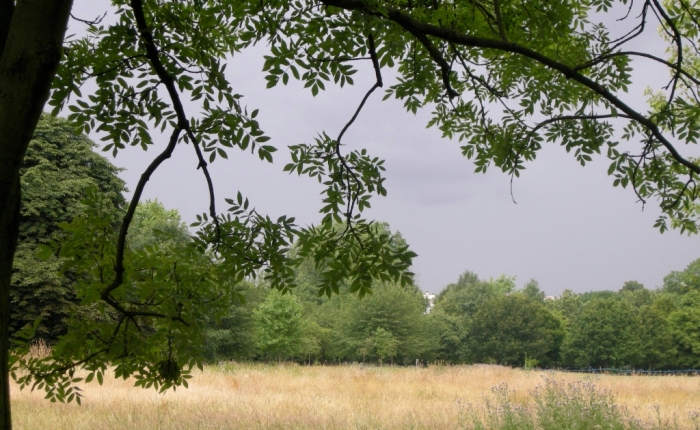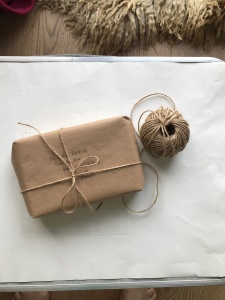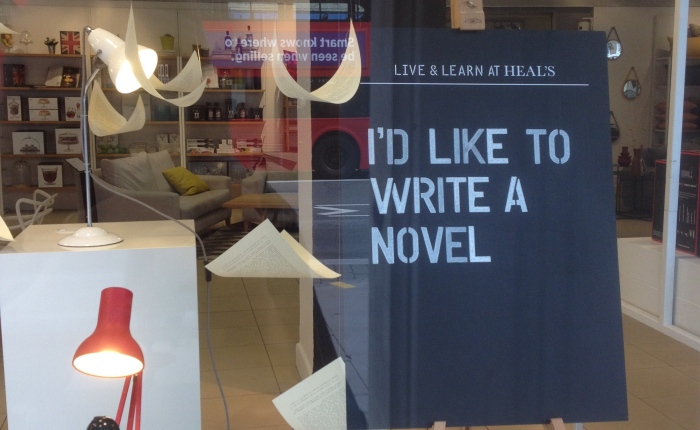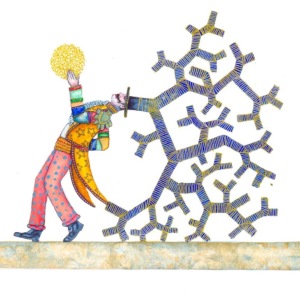I’m excited to be running a beginners adaptation workshop at the Finchley Lit Fest… we will be looking at a short story text and playing with ideas to take it onto the screen. The process will enable you to work on your own ideas later with more confidence. There will be a chance for attendees to talk briefly about their own ideas for adaptation and get some feedback. Tickets are bookable through MeetUp.
I first got interested in adaptation when I was studying English and Drama at Middlesex for my first degree. My drama classes focused on the technical skills of performance, which was no bad thing for a writer because even though I didn’t want to act, I felt I needed to know something about where the actor comes from. But my main aim was to write, so I persuaded my lecturers to let me adapt Flann O’Brien’s Third Policeman as my final project.
What surprised me was how collaborative the process was. The scene I gave to the actors first off was not entirely the one we ended up with. The process of having actors feedback which of my lines didn’t quite work, or re-ordering my scene, was humbling because they were mostly right.
I like working with others and I try to make my workshops as collaborative and fun as I can. So Fran Lima, an actor, will be joining us for the workshop. She’s done quite a bit of TV so she can answer questions from an actor’s point of view and she also writes.
This workshop is not for the super-career-minded or those seeking ways to get finance for projects. I’m happy to point you towards the professional providers but my workshops are about playing with ideas.
When I’m writing fiction, I feel my way into the story alone and I rarely talk about it before I set pen to paper. In fact I’m superstitious about discussing a story in embryo…because my unconscious will convince itself the work is done if I do, and I’ll never write the thing. So, I’ll probably go to my writers’ group with a second draft – and then I will talk about it. But with adaptation, right from the ideas stage, writers seem to be discussing concepts and ideas with other creatives.
When you’re adapting something though it’s a long time before you get to writing. You dream, visualise, toss ideas around long before your characters start speaking on the page. I spoke to screenwriter Elinor Perry Smith who occasionally teaches for Pearse & Black:
Screenwriting can be a lonely process in the early stages, she says, in that you have this great idea, you get your logline/concept nailed, then the outline, then you flesh out a treatment, then it all changes! Oh joy…
I do find that it’s very helpful to discuss your concept at the earliest stage with peers that you trust, or pay for feedback from a professional. This is something that not many screenwriters do when they first set out – and I was no exception. I think it’s vital to remember that film-making is an entirely collaborative act. Everything WILL probably change!
Your ‘first’ draft is probably more likely to be your fifth… it’s only your first in that it’s the first to see the light of day with someone else’s critical faculty brought to bear on it. Screenwriters discover that they’re in it for the long haul but can easily lose heart after bad feedback or a disheartening peer review. The sensible screenwriter, therefore, develops relationships with allies – people they can trust NOT to trample all over their dreams and with whom they can reciprocate.
I love the way she puts that – you need people you can trust not to trample on your dreams. We all do. Pearse and Black workshops are based on ground rules that keep things safe and provide the most creative space possible. Editing comes later.
So the difference in the process of making the script public here is a treatment – in prose only non-fiction writers submit an equivalent proposal without much actual writing and sometimes none having been done. Novelists are expected to have their whole manuscript finished, and the best it can be, before they approach the industry.
The other difference is that phrase everything changes. It’s true that editorial feedback for fiction writers might result in a re-structuring but in my experience, not to that extent.
In all writing at some point in the process you are on your own, in your writing space, listening for the next line and whether its dialogue or prose, you have to show up and wait for the right words. We come together in workshops briefly to share this strange and wonderful thing we do.
But briefly, back to Middlesex… for my acting skills I chose physical theatre, so I ended up getting six credits of my degree in juggling. I can still do it a little. It helps me think.
In the workshop we will look at what draws you to a story, what kind of freedom there is in adaptation. And although there wont be any juggling, there will be food for thought.








